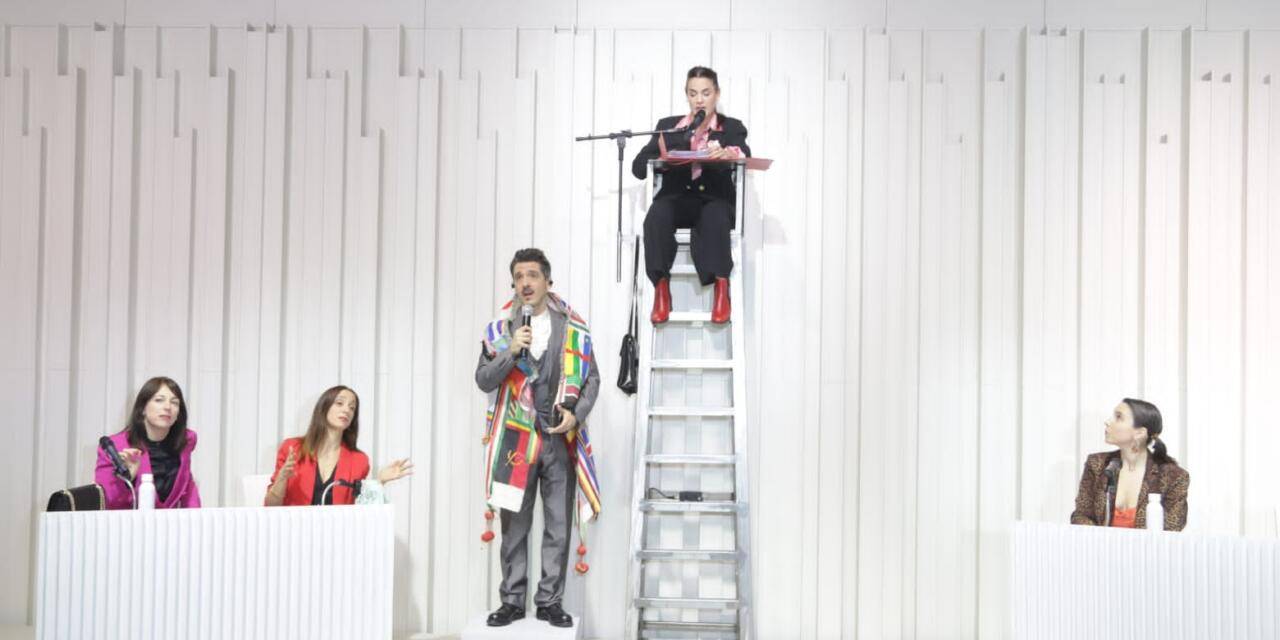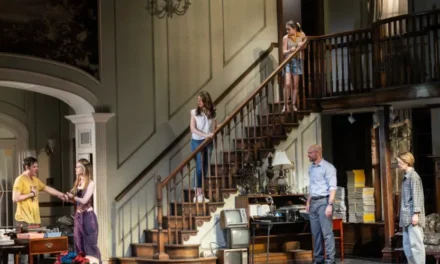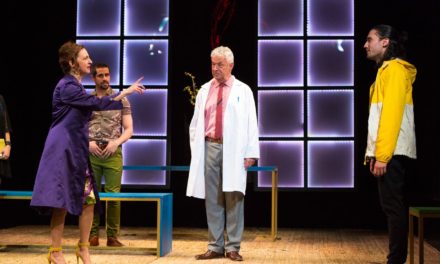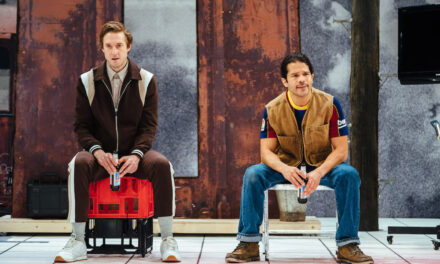Piel de Lava have been making work for 20 years and it shows. Elisa Carricajo, Valeria Correa, Pilar Gamboa and Laura Paredes may be best known in the English-speaking world for their film work both as a company, on Mariano Llinás La flor (2018) and on individual projects, but Piel de Lava remains one of those well-kept secrets – a company who produce consistently terrific work that provokes, challenges and entertains. It’s work that presents a unique world in each production: witty, physical, funny but always rooted in topics that feel timely and important. They have consistently managed to find a theatrical language for the temper of the times. Parlamento is their sixth production, following the commercial hit, Petroleo (2018), a reflection on politics and performance that satirically deconstructs the populist rhetoric of the right with candour, grit and sardonic humour by following the activities of a dysfunctional parliament in space that is looking to govern Earth from a distance where it can issue decrees without getting its hands too dirty.
The stage is busy from the moment the audience enters. Pilar Gamboa’s President of the Global Orbit Parliament sits up high on a laddered tower like a tennis umpire. Around her two desks where Elisa Carricajo’s Italian congresswoman, Messina, wanders around in a pink trouser suit and black blouse, waving her hands about emphatically. Valeria Correa’s Neve da Cunha swings her handbag in dismay, her striped trousers and point to a politician who likes to be noticed. Laura Paredes’s Hortensia Caridad Morales boasts an orange satin top, leopard skin jacket and rust trousers with gold hoop earrings and scraped back hair completing the look. She is purposeful in her manner, disdainful in her looks. The three women on the ground sometimes confide in each other, sometimes they look at each other with contempt. The President is clutching a pile of papers in a file, getting ready to open the parliament for “business”. But “business” is a limited context for a parliament that only appears to perform being at work when the cameras are switched on.
Indeed, governance takes place in front of the cameras as Gamboa’s pedantic President pontificates, loftily quotes Calderón de la Barca and Quevedo, and insists on the importance of observing protocol. Her preoccupation as she tries to keep out of the camera’s view the drinks and snacks brought to her by the Chromas — the silent labourers in green all-in-one bodysuits who diligently service the Parliament, invisible to the camera. She peers over her glasses in disdain, invoking any number of ordinances to silence the other congresswomen who talk over her. She has an armoury of regulations and procedures, and the ability to call for a recess, to ensure nothing changes. She controls when the parliament is or isn’t in quorum. Her mouth contorts like that of a fish and she swallows her words. Her accent may suggest she is from Madrid, but her pompous, emphatic enunciation appears to invoke the former Catalan President, Jordi Pujol.
“I’m calling you to order” is one of her favourite phrases, repeated endlessly in robotic fashion. She insists on the need to respect “decorum” while presiding over a parliament where respect and etiquette are consistently undermined. The call for a retraction for any statement she disagrees with is another favoured expression. She flicks her tongue like a lizard, unable to control the impulse in front of the cameras. Messina and Neve place a file of papers – colour coordinated to their outfits — over their faces to avoid being associated with the President and Hortensia’s fallout. The President secures the loud Hortensia’s exit from the parliament although, like a bad smell, Hortensia lingers and returns. A series of appalling statements are issued by the President in the name of protecting democracy. Some are throwaway lines, as with “Shame is stealing and not taking it home.” She is often emotivisima (very emotional): emotion here harnessed to imply empathy and compassion. Any disagreement is about “upsetting” rather than fortifying democracy. Opinions are not to be challenged. To Hortensia she proclaims, “Let her voice be left bare so none will listen to it”. Hortensia dances across the parliament building in disobedience before leaving the chamber in disgust. The President’s fake smile, like that of a Cheshire cat, is terrifying in the extremity of its width. She jabbers and blathers, unwilling to let others speak. “There is no room for error”, she insists: the image must always be of slick perfection, no hair out of place, no wrinkle on the clothing, no grimace captured by the camera. Here, looks, rather than behaviour, are everything.
The three congresswoman each have their own priorities. The Italian Messina seduces with her hoarse Marlene Dietrich voice – a musicality of tone cutting through the deep vocal register. She dismisses protocol and is always keen to ride into action – literally on one of the Chroma assistants in the promo video she makes for her constituents. She deploys rhetoric consistently, defining her mission to Neve as “breastfeeding democracy like a baby”. She speaks of working to restore peace but generates conflict in the Parliament. She sees herself a warrior keen to restore “traditions” that are being lost. Tradition is about constructing an order based on her values and priorities alone.
Neve de Cunha is the newest congresswoman – the accent suggests she is Brazilian, but the production evades discussion of nationalities; it is blocks and territories instead of nations and states that the politicians speak of. The President may ask that no congresswoman bring their own families and histories into the discussion, but all do. Neve lost a relative to gang violence and passionately defends the right to carry arms – justice is only ever about weapons. All violate conflicts of interest while insisting that they are not acting in a personal capacity. Hypocrisy and offence are the order of the day.
Hortensia insists on not being a politician but just an “ordinary” worker, like the two reluctant Chromas she coerces into appearing in her promo video. Her accent has touches of Venezuelan and Andalusian, and her quick-fire dialogue leaves no space for challenge. She speaks of listening and nods intensely but gives no room for the Chromas to respond; instead, telling them off as soon as the recording is over. She speaks of difference, wanting to disassociate herself from her fellow congresswomen, but her conflation of rights and desires, and her insistence that juvenile crime is the cause of negligent mothers who lack “desire”, demonstrates an inflexibility as great as that of her colleagues. Her rhetoric urges her followers to “Set fire to ourselves, building and things” — there is no understanding of the consequences of what she proposes.
The President is always harking back to the past. The Parliament in Global Orbit is created as a version of Stockholm’s Riksdag. There is always a referent, even if it is appropriate to the task in hand. Messina is supporting her in the proposed legislation to rebuild parliamentary buildings lost to fire. The buildings need to be in place to “contain” tradition; democracy here is just the façade or edifice rather than behaviour or actions.
Zypce is the show’s fifth performer, positioned stage right with computer, microphone and the toys to create the evocative sound effects that so animate the production. The musician is invoked by the President to perform ceremonial hymns to open the parliament with its earnest “flag ceremony” and to announce changes to the order of service or processes of governance. He creates a series of live sound effects to accompany the action – horses, the sound of an object landing on the floor, the applause and chatter of the other congresspersons, the gavel calling the parliament to order. Representation here shown to fabricate the real. Bland supermarket atmospheric music plays in the background – an anodyne soundtrack to these toxic politicians as the parliament prepares for business. He secretly deploys the private security phone system to call his mother in Italy — he watches the politicians disrespect regulations and follows suit. He renders emotive numbers, Puccini’s “O mio bambino caro” from Gianni Schicchi and a version of “Tomorrow’s People”, the number from Coca Cola’s iconic 1986 commercial, to animate the people: “I am the future of the world, I am the hope of my nation, I am tomorrow’s people, I am the new inspiration” are the words of the Coca Cola commercial, here deployed as slogans to harness emotions that have the potential to mobilise or anaesthetise the populace. No-one listens to, or cares about, content and meaning. Seduction through oratory is all. There is no strategy for implementing what is promised, no vision that must be realised, simply endless rhetoric and endless performance. Alliances and collaborations are opportunistic — Messina’s kiss of Hortensia a mafioso’s handshake, evoking the kiss Michael gives to Fredo in The Godfather II.
Parlamento is a piece about the normalisation of far-right politics, as Messina comments sanguinely: “Things happen one day and then we get used to them.” What, it asks, have we got used to and why? When the President is replaced in the tower by just her shirt and jacket, replete with medals, and an automated recording for a voice, no-one seems to care or spot the difference. Are these politicians always on automatic pilot? The show continues unperturbed by the change in President because the appearance of the President, the uniform and rhetoric remains in place.
Parlamento explores with wit the gestural language and techniques of a range of women far right politicians empowered by feminism who promote anti-progressive politics. The piece was crafted through a research residency at the multidisciplinary Arthaus Central in Buenos Aires, performed in development through to November 2023. The festival here offers its first performance outside Buenos Aires. Rodrigo González Garillo’s bright costumes are as brash and in-yer-face as the politicians themselves and the acting from all five performers is glorious — heightened, satirical, at times almost cartoonish, but rooted in a register that is all too real. Indeed, as the election of Javier Milei as Argentina’s President in November 2023 demonstrates, reality is often stranger than fiction.
Parlamento plays at GAM as part of Santiago a Mil on 19 and 20 January 2024.
This post was written by the author in their personal capacity.The opinions expressed in this article are the author’s own and do not reflect the view of The Theatre Times, their staff or collaborators.
This post was written by Maria Delgado.
The views expressed here belong to the author and do not necessarily reflect our views and opinions.


















